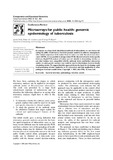| dc.contributor.author | Shafi, J | |
| dc.contributor.author | Andrew, PW | |
| dc.contributor.author | Barer, M R | |
| dc.date.accessioned | 2013-07-03T06:54:31Z | |
| dc.date.available | 2013-07-03T06:54:31Z | |
| dc.date.issued | 2002 | |
| dc.identifier.citation | Comp Funct Genomics. 2002;3(4):362-5. doi: 10.1002/cfg.191. | en |
| dc.identifier.uri | http://hinari-gw.who.int/whalecomwww.ncbi.nlm.nih.gov/whalecom0/pubmed/18629269 | |
| dc.identifier.uri | http://erepository.uonbi.ac.ke:8080/xmlui/handle/123456789/44406 | |
| dc.description.abstract | In response to a large local school-based outbreak of tuberculosis, we have been evaluating the utility of microarray bacterial genomic analysis in outbreak management. After initial comparison of the isolate from the index case with Mycobacterium tuberculosis H37Rv, it was possible to design robust PCRs directed towards strain-specific deletions. Rapid PCR analysis of isolates proved valuable in determining whether or not other isolates were compatible with the outbreak strain and further microarray studies revealed genetic markers that could be used to discriminate between locally circulating strains.We suggest that this approach forms the basis for developing rapid local genotyping schemes applicable to M. tuberculosis and that application to other pathogens warrants consideration. | en |
| dc.language.iso | en | en |
| dc.publisher | University of Nairobi | en |
| dc.title | Microarrays For Public Health: Genomic Epidemiology Of Tuberculosis. | en |
| dc.type | Article | en |
| local.publisher | Institute of Tropica and Infectious Diseases(UNITID) | en |

